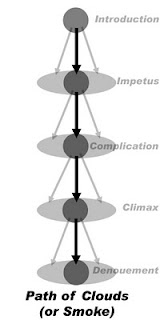Back to Quincunx
I've just about finished my "Little Game Chef" entry, those who are familiar with my work will be able to pick it instantly. Then it's a break from my own games. Avalon seems to be fairly professional in their dealings with freelancers. I've submitted an outline for my booklet "How to make a GREAT dungeon", and they seem happy enough with it that they're already interested in offering me some more work. But for my own stuff, it's back to my Quincunx graphic novel, the source of inspiration driving the RPG I've been working on for the past few years. I've had the outline of my story for quite some time, there are notes going back to 2006, and a preliminary version dating back to meeting David Mack during his visit to Sydney Supanova in 2002 (Quincunx began as a homage to Kabuki, a story within that world focusing on one of the other operatives...but then I decided to take the story for my own and introduce some of the other elements I wa...



